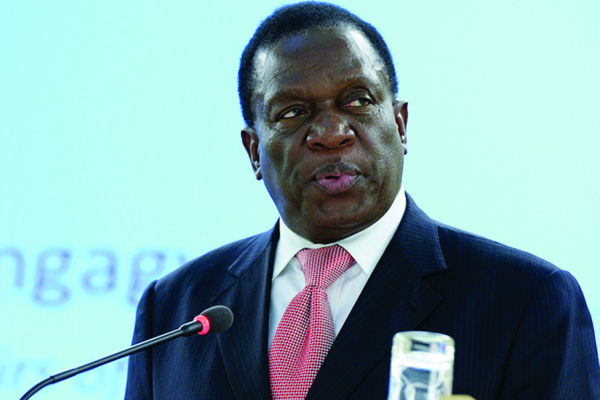
IN fulfilment of Section 140 of the Constitution, President Emmerson Dambudzo Mnangagwa on Tuesday this week delivered the State of the Nation Address (Sona) and officially opened the Ninth Parliament of Zimbabwe. The address lays the foundation for members of the National Assembly and Senate to execute their law-making and executive oversight functions.
Guest column: John Makamure
Section 140 (1) of the Constitution empowers the President to address either house of Parliament or a joint sitting of both houses. Section 140 (4) says at least once a year the President must address a joint sitting of both houses of Parliament on the state of the nation. It is my hope that President Mnangagwa will do so more regularly in order for the nation to keep adequately informed of policy developments.
The Sona is largely positive in that it dwells on critical issues of public interest. By nature, a state of the nation address is not there to provide concrete solutions to problems affecting the nation, but to provide general direction on how the government intends to address the issues.
The President highlighted about 30 Bills his government expects to bring to Parliament for consideration during the first session of the Ninth Parliament. A number of the Bills mentioned were either awaiting gazetting or were already before the Eighth Parliament when it was dissolved. The legislative agenda largely relates to the ease of doing business, completion of the process to align laws with the Constitution, media reforms, child protection and ratification of international legal instruments.
Key pieces of legislation that will underpin the economic agenda include the Companies and Other Business Entities Bill which is intended to overhaul the Companies Act; Regional Town and Country Planning Bill to reduce the time and procedures for processing construction permits; Zimbabwe Investment and Development Agency Bill to consolidate various pieces of legislation and provide for the establishment of a one-stop investment centre; Mines and Minerals Amendment Bill to address some inadequacies in the one passed early this year, and further provide for online registration of mining rights and title; Gold Trade Bill and Precious Stones Bill to curb leakages of precious minerals; a Bill to establish the Institute of Education, Research, Innovation and Development and to align with the programme on value addition and import substitution strategies; Consumer Protection Bill to protect consumers from unfair trade practices and abuse by suppliers of sub-standard goods; and the Tripartite Negotiating Forum Bill to facilitate participatory development by fostering greater collaboration between all social partners.
The devolution of power as provided for in Chapter 14 of the Constitution will see the Rural District Councils Bill coming before Parliament to give rural councils greater autonomy. The Provincial and Metropolitan Councils Bill will be enacted to facilitate the devolution of governmental powers and responsibilities to provincial and local authorities. Through the Bill, provincial and metropolitan councils will be reconfigured in accordance with Chapter 14 of the Constitution. The Bill will further seek to facilitate enhanced coordination between central government, provincial councils and local authorities, within the context of the decentralisation and devolution programme.
Other important pieces of legislation include the Zimbabwe Media Commission Bill and Broadcasting Services Amendment Bill that are expected to further open up the long overdue media space. The Public Finance Management Amendment Bill will be tabled to facilitate the allocation of sufficient resources for basic social services and economic development at the local level. This Bill must also include other far-reaching amendments to fully align the law with the Constitution and other good practices in public financial management. The Auditor-General has over the years been issuing damning reports on financial performance by ministries, agencies and departments. All these leakages must be plugged through a robust Public Finance Management Act.
- Chamisa under fire over US$120K donation
- Mavhunga puts DeMbare into Chibuku quarterfinals
- Pension funds bet on Cabora Bassa oilfields
- Councils defy govt fire tender directive
Keep Reading
In order to further protect children’s rights as provided for in various international and regional instruments that Zimbabwe is party to, the Child Justice Bill will be enacted to provide for a strong child justice system. The Marriages Amendment bill will be tabled to outlaw child marriages. This will be supported by the Mandatory Sentencing for Rape and Sexual Abuse Bill.
Apart from legislation to be tabled before Parliament, other important issues highlighted included importance of macroeconomic stabilisation, tackling the unsustainable fiscal deficit, resolving the debt crisis, reforming public enterprises, availing more facilities to address foreign exchange shortages, fighting corruption and inculcating a new culture of doing business in government characterised by responsiveness, transparency, accountability and doing away with bureaucratic red tape.
Now that the Sona is in the public domain, it is incumbent upon the law makers to unpack the statement, closely monitor implementation of the various promises, and ask hard questions on any lack of progress. There is no time for heckling or any other disruptive behaviour by the Members of Parliament. Citizens are keenly awaiting Parliament and other government agencies to bring food on their tables. It is the primary duty of Parliament to enact good laws that will give impetus to the economic revival efforts.
The vision for Zimbabwe to become a middle income economy by 2030 with per capita income of $3 500, increased investment, decent jobs, broad-based empowerment, and free from poverty and corruption can only be realised if Parliament fully exercises its legislative authority as provided for in sections 130 and 131 of the Constitution.
Thumbs up to the Speaker and the President of the Senate for taking the leadership of Parliament and senior management for a retreat this weekend to map out a framework for how business will be conducted during the Ninth Parliament in order for the institution to become more effective in its constitutional mandate.
John Makamure is the executive director of the Southern African Parliamentary Support Trust. Feedback: [email protected]; @john_makamure











